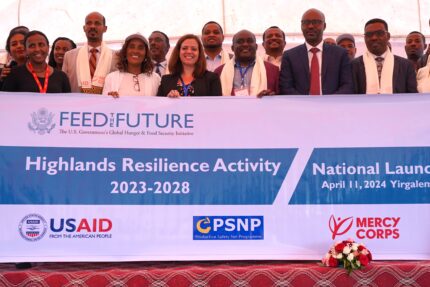Trending

Government must implement «shifting the raw material export model » to solve the Ethiopian private Food processing industries challenges – Professor Shimelis Admassau.
(April 10, 2024) The Ethiopian government must implement «shifting the raw material export model » to solve the key current challenges in the private food processing industry sectors which are inputs, finance, infrastructure, […]
Business News
by Ayele Addis
City Groundwater is almost out of water supply. : Addis Ababa’s groundwater dried up. The residents of the cities suffer the impact of climate change
By Ayele Addis Ambelu ; ayeleradio@gmail.com +251918718307 There is not enough water. We are dirty enough; we will get messy. There is not enough water for us, the toilet, the yard, our house, […]
AFRICA FEATURED General Latest Magazine News Radio & TV Special Edition TOP STORIES
by Ayele Addis
Amidst Ongoing Global Conflicts, International Experts Gather to Discuss Institutionalizing Peace
HWPL’s 8th Annual Commemoration of the Declaration of Peace and Cessation of War (DPCW) Held on March 14 – In 2023 alone, conflicts like the Russia-Ukraine war, the Israel-Hamas war, and numerous international […]
AFRICA General Latest Magazine News Radio & TV Special Edition TOP STORIES
PM Abiy meets with Brazilian President Lula da Silva
Prime Minister Abiy Ahmed (PhD) today received and discussed with the President of Brazil Luiz Inácio Lula da Silva. “Today, it is my honor to extend an official welcome to Brazil’s President Luiz […]
AFRICA FEATURED General Latest Magazine News Radio & TV Special EditionPrime Minister Abiy Ahmed (PhD) today received and discussed with the President of Brazil Luiz Inácio Lula da Silva.
“Today, it is my honor to extend an official welcome to Brazil’s President Luiz Inácio Lula da Silva on his State visit to Ethiopia,” PM Abiy said via a post on his social media page.
During their discussions, the two leaders have addressed various bilateral and multilateral issues, reflecting the depth of the Ethiopia-Brazil relationship. “As Ethiopia joins the esteemed ranks of the BRICS group, we eagerly anticipate strengthened collaboration with Brazil, viewing our meeting as a pivotal step towards forging a robust partnership, the Premier added.
Earlier today, President Lula da Silva, along with First Lady Janja Lula Silva, visited the Adwa Victory Memorial Monument and laid a wreath at the monument. During his visit to the Adwa Victory Memorial Museum, the Brazilian leader’s delegation was accompanied by Mayor of Addis Ababa Ms. Adanech Abiebie and Minister of Finance.
Note that the Brazilian president has arrived in Addis Ababa late last night for an official state visit to Ethiopia, according to the Ministry of Foreign Affairs of Ethiopia.
The Brazilian President Luiz Inácio Lula da Silva arrived in Addis Abeba, tonight for an official State visit.
Upon his arrival at Bole International Airport, Ambassador Taye Aske-Selassie, Minister of Foreign Affairs of Ethiopia, accorded him a warm welcome.
PM Abiy Ahmed received Brazil’s President Luiz Inácio Lula da Silva @LulaOficial, who is currently undertaking a State visit to Ethiopia. The two leaders engaged in substantive discussions aimed at bolstering cooperation and nurturing a more profound partnership.
Brazil’s President Luiz Inácio Lula da Silva on his State visit to Ethiopia, Prime Minister Abiy wrote on his social media page.
“During our discussions, we have addressed various bilateral and multilateral issues, reflecting the depth of our relationship,” the premier said.
PM Abiy further noted that as Ethiopia joins the esteemed ranks of the BRICS group, we eagerly anticipate strengthened collaboration with Brazil, viewing our meeting as a pivotal step towards forging a robust partnership.

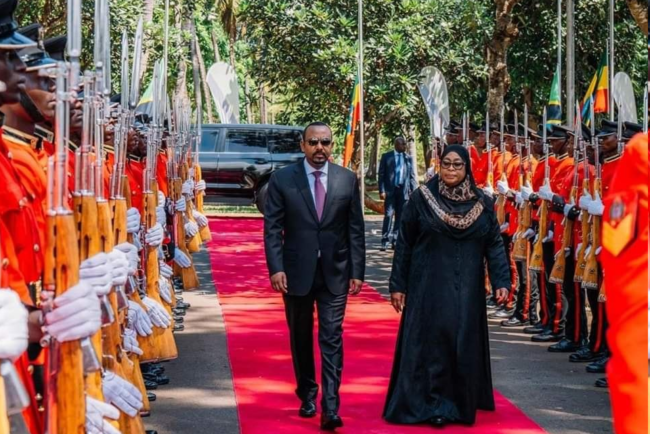
Tanzania and Ethiopia deals
Tanzania and Ethiopia this week signed bilateral agreements targeting agriculture, trade, energy air transport and aviation technology exchange. Tanzanian President Samia Suluhu Hassan and the visiting Ethiopian Prime Minister Abiy Ahmed on Friday […]
AFRICA FEATURED General Human Rights Latest Magazine News Radio & TV Special Edition TOP STORIES TOP VIDEOSTanzania and Ethiopia this week signed bilateral agreements targeting agriculture, trade, energy air transport and aviation technology exchange.
Tanzanian President Samia Suluhu Hassan and the visiting Ethiopian Prime Minister Abiy Ahmed on Friday witnessed the signing of agreements to strengthen trade between the two countries.
Ministry of Foreign Affairs and East African Co-operation said on Friday that the two leaders agreed to deepen trade and bilateral relations that would create new opportunities for trade between Tanzania, with a population of over 61 million, and Ethiopia, with a population of more than 100 million people.
Tanzanian Minister for Foreign Affairs and East African Co-operation January Makamba said that the MoUs would open up new markets, investment and trade in key sectors, especially in coffee and tea.
“Ethiopia is globally renowned for coffee and tea production, Tanzania’s tea and coffee are equally popular, therefore, how to access markets together will be an integral part of bilateral agreements during this visit,” Mr Makamba said.
Ethiopia is among the leading coffee producers in Africa and the biggest coffee consumer in Eastern Africa.
Collaboration
Tanzania and Ethiopia have been collaborating in the aviation sector. A total of 75 pilots and 25 engineers from Tanzania received training at various levels in Ethiopia between 2016 and 2023, while Ethiopian Airlines and Air Tanzania have been operating through joint commercial operations, Mr Makamba said.
The two countries agreed to co-operate in power generation through technology exchange under the East African Power Pool programme. The Tanzanian government has been seeking experts from Ethiopia to advise and help it set up hydroelectric power stations as well as irrigation and land use technology for higher production of electricity, crops and quality livestock products.
They further agreed to end human trafficking involving Ethiopia nationals.
Tanzania has been collaborating with Ethiopia and other international immigration bodies to destroy human trafficking networks.
Tanzania has been transit route for illegal immigrants from Ethiopia sneaking to Southern Africa states to seek economic fortunes.
Several Ethiopian nationals have been intercepted in Tanzania on their way to South Africa and other Southern African states while travelling in cargo trucks and empty oil tanks.
Mr Abiy who arrived in Tanzania on Thursday was expected to complete his tour to Tanzania on Saturday.

https://www.theeastafrican.co.ke/tea/business/tanzania-and-ethiopia-seal-trade-deals-4542976

Beyond Headlines: Global Journalists United for Peace Journalism amidst the Challenges of the Unstable International Situation
On 17th February, the international peace organization Heavenly Culture, World Peace, Restoration of Light (HWPL) hosted an online event with approximately 160 media persons from 49 countries in attendance. This year, the HWPL […]
AFRICA Election & Democracy Entertainment Environmental Science FEATURED General Human Rights Investigative Reports Journalism and Communication Latest Magazine News Radio & TV Special Edition TOP STORIES TOP VIDEOSOn 17th February, the international peace organization Heavenly Culture, World Peace, Restoration of Light (HWPL) hosted an online event with approximately 160 media persons from 49 countries in attendance. This year, the HWPL International Workshop on Peace Journalism marked the publication of its 2nd journal, ‘Peace Journalism Studies’, produced in cooperation with nine journalists worldwide.
With the theme of “Media Perspective on Conflict Resolution,” this event aimed to share the ideas of peace journalism, bringing out the collective voice of the international media network for peace and suggesting future action plans to appeal to people around the globe to have peace in their minds. Among the contributors, six speakers delivered addresses on the role of media in building peace, peace-related issues, peace journalism, and global security.
Innocent Yuh, Regional coordinator of the Cameroon Association of Media Professionals (CAMP) South West Region Cameroon, pointed out the need to discuss peace journalism. “In navigating the delicate tapestry of conflict and discord, Peace Journalism emerges as a beacon of clarity, an instrument of empathy, and a catalyst for meaningful change. Peace Journalism unfolds as a conduit for open dialogue, providing platforms for varying perspectives, and cultivating a deep engagement with the multifaceted nature of conflict a resolution,” he said.
Emphasizing the importance of the code of ethics for peace journalism, Hendry Nursal, Editor-in-Chief of Jambidaily.com, stated, “Journalists must be able to be present at the events. We cannot deny that the media must strive to be in a position to remain a source of correct information and present it professionally according to rules such as a code of ethics. This ensures that journalists are responsible, specifically searching for and presenting information.”
IhorShevyrov, a journalist and lawyer from Ukraine, appealed to the participants about the role of peace journalism in creating a foundation for resolving the conflict. “The war in Ukraine poses threats to global security. It should also be emphasized that not only states are influential “players” in strengthening global security. This is also the interest of civil society and civil society institutions. Peace journalism helps to establish communications between parties in conflict,” he said.
Lok Bahadur Chaudhary, Founder, Publisher, and Editor of Hamarpahura.com, suggested a practical approach by journalists for peacebuilding by saying, “We not only raise awareness but also inspire individuals to engage in the pursuit of peace actively, hastening the realization of a peaceful world. Regular reporting of global peace events should be a monthly endeavor in each country.”
Regarding the positive role of social media by individuals for peacebuilding, Oral Ofori, Founder of TheAfricanDreamCompany, said, “Social media enables people from different cultures and backgrounds to engage with one another directly. When used positively, interactions on these digital platforms can foster a global community that works collectively towards peace and mutual understanding. Grassroots reports have brought attention to conflicts that might have gone unnoticed or unreported.”
“By 2022, 60% of the public believes that the news contains bias or disinformation. In its meaning and principles, peace journalism is a journalism practice that aims to minimize conflict, promote dialogue, and help build peace in society. HWPL is the only international non-governmental organization that calls on all media to promote peace,” said Rana Setiawan, Chief Reporter of Mira Islamic News Agency (MINA).
The host organization, HWPL, is globally engaged in initiatives not only in journalism but also in peace education, interfaith dialogue, youth and women’s activities, and the establishment of international law for peace. As HWPL continues to champion peace journalism, the event resonates as a call for a media effort, urging all media outlets to embrace their role in fostering a world united in pursuit of lasting peace.


The 80MW Regional Rusumo Power Project Delivers 66 Million KWh to three Countries and has the Capacity to Operate at 105 percent, says PM
Between November 3, 2023, and January 31, 2024, the 80MW Regional Rusumo Falls Hydroelectric Project delivered a total of 66 million kWh of electricity to three countries, with Burundi receiving the highest allocation […]
AFRICA FEATURED General News Radio & TV Special Edition TOP STORIES TOP VIDEOS
Between November 3, 2023, and January 31, 2024, the 80MW Regional Rusumo Falls Hydroelectric Project delivered a total of 66 million kWh of electricity to three countries, with Burundi receiving the highest allocation of 22 million KWh while Rwanda and Tanzania both received 21 million KWh. The Rusumo Project Manager (PM) Eng. Alloyce Oduor revealed this on February 1, 2024.
“After completing all required tests, NELSAP has signed the certificates of completion and handed over two of the three turbines to the Rusumo Power Company Limited (RPCL), the special purpose vehicle formed by the three countries to manage the plant on their behalf, after completion and handover from NELSAP,’ said Eng. Dr. Isaac Alukwe, NELSAP-CU Regional Coordinator. The Rusumo plant has three.
“All three turbines have been tested, and each can operate at 105% individually,’ said Eng. Alloyce Oduor. The Project Manager said this while addressing journalists from seven (7) NEL countries that visited the plant on January 31, 2024. Final tests on the third turbine are ongoing. Once engineers complete the tests, NELSAP and RPCL will sign a final handover certificate ahead of the official inauguration by the heads of States of the three countries, planned for April 2024.
“Burundi’s peak power demand is an average of 90MW, so if the country gets 27MW from Rusumo, it will represent a significant percentage of lower-cost power. Rwanda has an average peak power demand of 250MW, and an additional 27MW is technically substantial. Tanzania, on the other hand, has a peak power demand of over 1,000MW. Whereas an additional 27MW may look relatively small, it is significant because it will stabilize the voltage level of the Northern and North-Western parts of the country and make the quality of power in that region better and more reliable,” added Eng. Oduor. He explained that the critical causes of power outages are an imbalance between generation and uptake and added that these two must
<< All three turbines have been tested, and each can operate individually at 105%. Final tests on the third turbine are ongoing and once complete, NELSAP and RPCL will sign a final handover certificate ahead of the official inauguration >>
Match on a second-by-second basis, and disturbances can occur if they don’t match at any point.
The World Bank-funded 80MW Regional Rusumo Falls Hydroelectric Power Project is a low-cost renewable energy source that will lower the cost of power in the countries and stabilize the voltage levels. Once power from the plant enters the country’s grid, the utilities can switch off expensive fossil-fuel-generated energy sources. The utilities will then pass these lower costs to end users. The Rusu-mo Power project is a notable example of the benefits of transboundary collaboration, and it holds great promise for the economies and people of the three countries. It will spur industrialization, improve the delivery of water, health, and education services, support economic activities like manufacturing, and improve people’s lives through access to lower-cost electricity.


‘One Resilient Common Future’ revealed as the theme for Commonwealth Day 2024, 15 February 2024
The Commonwealth Secretary-General, the Rt Hon Patricia Scotland KC, has announced the theme for Commonwealth Day 2024 as ‘One Resilient Common Future’. Commonwealth Day will be observed on Monday, 11 March. It will start with […]
AFRICA General Latest Magazine News Radio & TV Special Edition TOP STORIES TOP VIDEOS
The Commonwealth Secretary-General, the Rt Hon Patricia Scotland KC, has announced the theme for Commonwealth Day 2024 as ‘One Resilient Common Future’. Commonwealth Day will be observed on Monday, 11 March. It will start with various events and activities, including faith and civic gatherings, debates, school assemblies, flag-raising ceremonies, and cultural events. Commonwealth Day is celebrated by people across Africa, Asia, the Caribbean and Americas, the Pacific, and Europe. The Commonwealth Secretary-General, the Rt Hon Patricia Scotland KC, said: “Each year, we observe Commonwealth Day to recognize, celebrate, and invigorate our 56 member states, all of whom are committed to the Commonwealth Charter.
This year’s theme underscores the collective strength that enables us to confront and overcome present challenges, emerging with resilience. This paves the way for a future where wealth isn’t just widespread but genuinely equitable. “We have countries which are amongst the smallest and largest in the world. Our shared values bind us together, including a commitment to ensuring stronger and stable governance, a more sustainable environment, robust economies, and societies that empower Commonwealth citizens.” Secretary-General Scotland also took the opportunity, on behalf of the Commonwealth, to wish His Majesty King Charles III, the Head of the Commonwealth, a complete and fast recovery.
2024 is a CHOGM Year. This year’s Commonwealth Day theme reflects the focus of the upcoming Commonwealth Heads of Government Meeting (CHOGM), which will be held in Samoa in October 2024. When announcing the CHOGM theme in 2023, Samoa’s Prime Minister, Afioga Fiame Naomi Mataafasaid: “We look forward to sharing our unique Samoan communal culture and traditions as we come together to transform our one resilient family into a commonwealth.” During Commonwealth Week in March, world leaders, foreign ministers, young advocates, and delegates from across the Commonwealth will come together for wide-ranging conversations. Together, they will deliberate and decide on collective actions to solve shared challenges while suggesting initiatives that empower people, encourage growth, and bring transformative change. One of these initiatives is the declaration of the Commonwealth Year of Youth, which has focused on increasing projects to support the 1.5 billion young people of the Commonwealth. Commonwealth Day Activities Countries will observe the day by reading the Commonwealth Proclamation, hosting celebratory events, or dedicating the week to enlightening citizens about the Commonwealth.
The Commonwealth Secretariat’s website will serve as a central hub, providing free and accessible resources to support these diverse activities. In London, where the Commonwealth Secretariat’s headquarters are located, a reception will be held welcoming invited representatives from across the Commonwealth. Additionally, a vibrant, multicultural, multi-faith service at Westminster Abbey on 11 March will celebrate the rich tapestry of the Commonwealth’s people, history, and culture. The event promises reflections, performances, and readings by individuals spanning the diverse nations of the Commonwealth. Each year, one of the highlights of Commonwealth Day is the procession of Commonwealth flags at Westminster Abbey, with young flag bearers representing each of the 56 member states.
This year, Commonwealth Day events will also include a contingent of Speakers and Presiding Officers from the Commonwealth countries, UK Overseas Territories, Crown Dependencies, and the UK nations, specially invited by the Rt Hon Sir Lindsay Hoyle MP, the Speaker of the House of Commons in the UK. Each year, Commonwealth Day is commemorated to inspire and foster a dynamic and united community of our 56 member states. This year, the Commonwealth will celebrate even more milestones. On 26 April 2024, the 75th Anniversary of the modern Commonwealth will be celebrated.
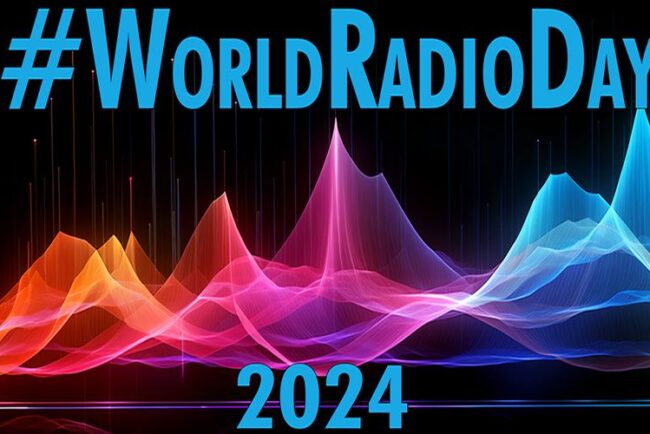
Radio: A century of information, entertainment, and education
Celebrating radio’s rich past, ongoing relevance, and promising future is the topic chosen by the United Nations Educational, Scientific and Cultural Organization (UNESCO) to mark World Radio Day 2024 on 13 February 2024. […]
General Journalism and Communication Media Litracy NewsCelebrating radio’s rich past, ongoing relevance, and promising future is the topic chosen by the United Nations Educational, Scientific and Cultural Organization (UNESCO) to mark World Radio Day 2024 on 13 February 2024.
With radio having crossed the 100-year milestone, it is a significant occasion to commemorate the medium’s extensive virtues and continuing potency. However, radio faces challenges to its audience and revenue numbers from digital platforms, social media, digital and generational divides, censorship, consolidations, and economic hardships.
At this special and pivotal point in its century-long journey, UNESCO invites the global radio industry in all its many forms – commercial, public, and non-profit – to join in this global celebration of the medium.
Anticipating the next century of radio
The 2024 observance highlights the history of radio and its powerful impact on news, drama, music, and sports. It also recognizes the ongoing practical value as a portable public safety net during emergencies and power outages, caused by natural and human-made disasters, such as storms, earthquakes, floods, heat, wildfires, accidents, and warfare.
Furthermore, the continuing democratic value of Radio radio is to serve as a grassroots catalyst for connectedness within underserved groups, including immigrant, religious, minority, and poverty-stricken populations.
Get involved in #WorldRadioDay
Broadcasters are encouraged to bring their own culture, style, and sensibilities to their celebrations leading up to and during the 13 February event. World Radio Day is an excellent opportunity for radio stations to connect with fellow broadcasters worldwide, and UNESCO invites them to take the initiative for such broadcasts.
UNESCO provides your station, network or show with a list of radio stations around the world willing to participate in programming partnerships with their colleagues in other countries. You can schedule interviews/conversations (either live or pre-recorded) with your broadcasting colleagues around the world to compare the history and role of radio in their respective countries on, or leading up to 13 February.
Simply register for the 2024 celebration and fill out the form if you, your station, or network is interested in partnering with others in this exciting process.

World Radio Day 2024: Audios
To celebrate World Radio Day, UNESCO releases several audio files that can be used free of charge and without copyright restriction in planning World Radio Day broadcasts and events.
Background
Proclaimed in 2011 by the Member States of UNESCO and adopted by the United Nations General Assembly (A/RES/67/124) in 2012 as an International Day, February 13 became World Radio Day (WRD).
Radio is a powerful medium for celebrating humanity in all its diversity and constitutes a platform for democratic discourse. At the global level, radio remains the most widely consumed medium. This unique ability to reach out the widest audience means radio can shape a society’s experience of diversity, stand as an arena for all voices to speak out, be represented and heard. Radio stations should serve diverse communities, offering a wide variety of programs, viewpoints and content, and reflect the diversity of audiences in their organizations and operations.
Radio is a low-cost medium specifically suited to reaching remote communities and vulnerable people, offering a platform to intervene in the public debate, irrespective of people’s educational level. It also plays a crucial role in emergency communication and disaster relief.
Radio is uniquely positioned to bring communities together and foster positive dialogue for change. By listening to its audiences and responding to their needs, radio services provide the diversity of views and voices needed to address the challenges we all face.
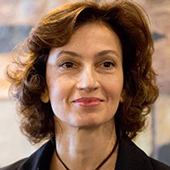
On this World Radio Day, we celebrate not only the history of radio, but also its central role in our societies, now and in the years to come”Audrey Azoulay, Director-General of UNESCO – Message
Listen
UNiting Against Hate

Hate speech – including online – has become one of the most common ways of spreading divisive rhetoric on a global scale, threatening peace around the world. Find out more about the UN’s #NoToHate campaign.
Awake at Night

What does it take to be a United Nations worker in some of the world’s most difficult and dangerous locations? Melissa Fleming finds out.
Read
- People for Peace: Likiso Irene Lasu Silwa, from fleeing war to building peace, one show at a time
- Veterans reflect on past, present and future of radio at the UN
Watch
UN Radio in South Sudan, a channel for peace
https://youtube.com/watch?v=z7HidjpyngM%3Fsi%3DZ0V4k9W5NZdxSw-T%26enablejsapi%3D1%26origin%3Dhttps%253A%252F%252Fwww.un.org


More than 150 civilian Amhara killed in Merawi town Ethiopia by the Government Soldiers: Merawi Massacre
Eyewitnesses said that more than 150 people were killed in Merawi city of Amhara region. Residents and eyewitnesses told the Africa News Channel that more than 50 people were killed in an attack […]
AFRICA FEATURED General Latest Magazine News Radio & TV Special Edition TOP STORIES TOP VIDEOSEyewitnesses said that more than 150 people were killed in Merawi city of Amhara region.
Residents and eyewitnesses told the Africa News Channel that more than 50 people were killed in an attack on Monday, January 20, 2016, in the Merawi town of the new North Gojam zone in the Amhara region.
#MessagefromAmbassador pic.twitter.com/uTrZq8eXN7
— U.S. Embassy Addis (@USEmbassyAddis) February 9, 2024
Residents who spoke to the Africa News Channel said that several people were killed in an attack on residents following a battle between the Defense Forces and Fano militants in the town of Merawi, which is about 35 kilometers from the capital of the region.
The Bahir Dar office of the Ethiopian Human Rights Commission (EHRC) has informed the Africa News Channel that it has received information from various sources about the attack on innocent people in Marawi City and is conducting monitoring and investigation.
Following the incident, the BBC spoke to five people, including a hospital source, and most of the residents said that the killings were carried out on civilians in their homes and on the streets.
Monday, January 20, 2016 Residents say that there was a “heavy battle” between the Defense Forces and the Fano forces from midnight before the attack, after which 50 to 100 people “disappeared.”
The eyewitnesses said that this attack took place around five o’clock in the morning after Fano’s forces left the city, “the defense forces went from house to house and killed the people they found on the road.” They said the attack lasted until one o’clock in the evening.
A resident said that his brother, a father of four who worked as a day laborer, was killed. Then they entered my brother’s house and took him away.”
The residents, who were waiting for their brother to be taken for questioning and returned, stated that they watched them being taken away and killed along with others.
“They killed a child with five bullets and dumped him on the cobbles in our neighborhood. They also gathered them [their brother and other people], and together, they took 13 people to the asphalt and killed them. … We believed them because we killed them.”
Regarding this incident, a medical expert confirmed to the BBC that he knew that 13 people were killed on the side of the asphalt, adding that a total of 85 people were killed in the city that day.
The civil servant, who did not want to be named and said that his younger brother was killed, said that his brother was taken away from his child’s arms and “brutally left me.”
“My brother was taken from his house with his child and killed. His wife said, ‘I was forced to accept the child. I received the child…They killed him on the road while he was looking at his forehead. She told me that they killed his friend who was with him.
Apart from their brother, they said that they saw 50 dead bodies on the road that day. However, they estimated that many people must have been killed “on every road and in every forest.”
Another eyewitness mentioned that they attended several funerals and put the death toll at over 100.
The day after the attack, January 21/2016, E.C., A resident of Merawi, said that 48 bodies were counted in the morning; “From Marzeneb Hotel to Bared River, there were only corpses left and right,” he said.
Putting the death toll at around 115, an eyewitness says that “from a six-year-old child to a 75-year-old man” was killed in the neighborhoods of Stadium and Health Center after the city was taken over.
An eyewitness who is a hospital worker said that 25 people, including a six-month pregnant woman, were injured at the city’s primary hospital and said, “There are no survivors.”
“The 24 came to the hospital dead. A six-month pregnant woman died on arrival at the hospital. A total of 25 people came,” he said.
Apart from the house-to-house searches, the security forces also “kneeled with revenge” on street people and day laborers, including model students, residents, families, and eyewitnesses.
Residents said that a “revenge action” taken in response to the sudden attack by Fano militants on Monday morning among members of the defense forces stationed in two locations in the city administration building was the reason for the killing of several people.
“Fanon brought you up; It is you who attacked you. A resident whose house was searched said they were “threatening” while saying, “You will reverse Fanon.” They said the attack was revenge, saying that we were silent because of “farewell from death.”
Residents told the BBC that they witnessed a horrible situation where many people were killed and dumped in different places.

“Most people were distinguished by their clothes and body shape. A witness told the BBC that the mass burial took place because it was challenging to identify the bodies.
Residents said, “According to the culture and tradition, the proper burial was not done for the people who were killed.” They described the attack as saying, “What happened was more brutal than brutal,” saying that it is not acceptable to mourn and cry.
According to residents, two churches in the area were “damaged with heavy weapons” in the fighting between the security forces and Fano militants. At the same time, personal property and 15 three-legged vehicles (Bajaj) were set on fire.
Residents added that the attack, in which many people were killed, happened on the eve of Maryam King’s Day, which is celebrated in the city on January 21 every year.
Even though it has been five days since the attack, the residents say the city is still frigid, banks and commercial establishments are closed, and there is “no activity.”
Efforts by the BBC to get an explanation and response from the regional and zonal administration and the local command post about the incident were unsuccessful.
It may be recalled that we have previously reported that civilians have been injured in the clashes between government forces and Fano militants in different areas of the Amhara region since last year.
Ethiopian Human Rights Commission (EHRC) October 19/2015 E.C In July 2015, E.C., there were armed conflicts in all zones in the Amhara region at different levels and times. As a result, many civilians have been killed and injured.
Residents said, “According to the culture and tradition, the proper burial was not done for the people who were killed.” They described the attack as saying, “What happened was more brutal than brutal,” saying that it is not acceptable to mourn and cry.
According to residents, two churches in the area were “damaged with heavy weapons” in the fighting between the security forces and Fano militants. At the same time, personal property and 15 three-legged vehicles (Bajaj) were set on fire.
Residents added that the attack, in which many people were killed, happened on the eve of Maryam King’s Day, which is celebrated in the city on January 21 every year.
Even though it has been five days since the attack, the residents say the city is still frigid, banks and commercial establishments are closed, and there is “no activity.”
Efforts by the BBC to get an explanation and response from the regional and zonal administration and the local command post about the incident were unsuccessful.
It may be recalled that we have previously reported that civilians have been injured in the clashes between government forces and Fano militants in different areas of the Amhara region since last year.
Ethiopian Human Rights Commission (EHRC) October 19/2015 In July 2015, there were armed conflicts in all zones in the Amhara region at different levels and times. As a result, many civilians have been killed and injured.
A statement said the EHRC had confirmed “the identity of at least 45 civilians who were extrajudicially killed by government security forces for allegedly ‘supporting Fano,’ ” an ethnic Amhara militia.
“However, it can be assumed that the number of victims is even higher,” it underscored.
The killings in the town of Merawi follow months of clashes last year between Ethiopia’s military and Fano, a “self-defense” militia.
The fighting prompted the federal government to impose a state of emergency in August that lawmakers extended by four months this month.
The United States last week said it was deeply concerned by reports of “targeted civilian killings” in Merawi and called for an independent investigation.
The Amhara violence reignited concerns about the stability of Ethiopia months after a peace agreement was signed in November 2022 to end a two-year conflict in the neighboring region of Tigray.
Amhara regional forces fought alongside federal troops against Tigrayan rebels. However, ties frayed in April last year when Prime Minister Abiy Ahmed’s government decided to dismantle state paramilitaries across the country.
Amhara nationalists said it would weaken their region and protested against the move.
In September, the EHRC accused federal government forces of carrying out extra-judicial killings in Amhara and mass arbitrary detentions in the region and elsewhere.
EHRC, who explained that the killing of many people in Merawi city was due to the intense shooting and house-to-house search during the conflict, said he heard from eyewitnesses that mass killings were carried out by taking men out into the streets through house-to-house searches.
According to the congregation, two women and a 17-year-old boy were among the dead.
Residents who spoke to the BBC said that the killing of civilians was the result of fighting between the security forces and Fano militants.
Family members and eyewitnesses said that most of the residents of Merawi town, which is about 35 kilometers from the regional capital, Bahir Dar, were killed in their homes and by civilians found on the road.
The eyewitnesses said that the attack lasted until one o’clock in the evening after Fano’s forces left the city at around 5:00 a.m.
Residents who spoke to the BBC at the time, including a medic, said more than 50 people had been killed, ranging from “a six-year-old child to a 75-year-old man”, based on the bodies they saw, with many saying the death toll could be more than 100.
The BBC heard from residents that some of the residents who felt threatened after the massacre of civilians in Merawi City fled to Bahir Dar and other areas.
Neither the regional administration nor the federal government has officially said anything about the incident in Marawi City, which is almost two weeks old.
Since the end of last year, following the unrest in the Amhara region, it is known that there have been clashes between the Defense Forces and Fano militants in many areas of the region.
Ethiopian Human Rights Commission (EHRC) October 19/2016 E.C In July 2015, armed conflicts occurred in all Amhara region zones at different levels and times. As a result, many civilians have been killed and injured.

Landmark UN Report Reveals Shocking State of Wildlife: World’s Migratory Species of Animals in Decline, Global Extinction Risk Increasing
Samarkand, 12 February 2024 – The first-ever State of the World’s Migratory Species report was launched today by the Convention on the Conservation of Migratory Species of Wild Animals (CMS), a UN biodiversity […]
AFRICA Environmental Science FEATURED General Investigative Reports Latest Magazine News Radio & TV Special Edition TOP STORIES TOP VIDEOSSamarkand, 12 February 2024 – The first-ever State of the World’s Migratory Species report was launched today by the Convention on the Conservation of Migratory Species of Wild Animals (CMS), a UN biodiversity treaty, at the opening of a significant UN wildlife conservation conference (CMS COP14). The landmark report reveals:
While some migratory species listed under the CMS are improving, nearly half (44%) show population declines. Over one in five (22%) of CMS-listed species are threatened with extinction. Almost all (97%) of CMS-listed fish are threatened with extinction. The extinction risk is growing for migratory species globally, including those not listed under the CMS. Half (51%) of Key Biodiversity Areas identified as necessary for CMS-listed migratory animals do not have protected status, and 58% of the monitored sites recognized as essential for CMS-listed species are experiencing unsustainable levels of human-caused pressure.
The two most significant threats to CMS-listed and all migratory species are overexploitation and habitat loss due to human activity. Three out of four CMS-listed species are impacted by habitat loss, degradation, and fragmentation, and seven out of 10 CMS-listed species are affected by overexploitation (including intentional taking and incidental capture). Climate change, pollution, and invasive species also profoundly impact migratory species. Globally, 399 migratory species threatened or near threatened with extinction are not currently listed under the CMS. Until now, no such comprehensive assessment of migratory species has been carried out. The report provides a global overview of migratory animals’ conservation status and population trends, combined with the latest information on their main threats and successful actions to save them.
Inger Andersen, Executive Director of the United Nations Environment Programme, said: “Today’s report clearly shows us that unsustainable human activities are jeopardizing the future of migratory species – creatures who not only act as indicators of environmental change but play an integral role in maintaining the function and resilience of our planet’s complex ecosystems. The global community has an opportunity to translate this latest science of the pressures facing migratory species into concrete conservation action. Given the precarious situation of many of these animals, we cannot afford to delay and must work together to make the recommendations a reality.”*****
Billions of animals make migratory journeys each year on land, in the oceans, and in the skies, crossing national boundaries and continents, with some traveling thousands of miles across the globe to feed and breed. Migratory species play an essential role in maintaining the world’s ecosystems and provide vital benefits by pollinating plants, transporting critical nutrients, preying on pests, and helping to store carbon.
Prepared for CMS by conservation scientists at the UN Environment Programme World Conservation Monitoring Centre (UNEP-WCMC), the CMS State of the World’s Migratory Species report uses the world’s most robust species data sets and features expert contributions from institutions, including BirdLife International, the International Union for Conservation of Nature (IUCN) and the Zoological Society of London (ZSL).
The report focuses on the 1,189 animal species recognized by CMS Parties as needing international protection and listed under CMS. However, it also features analysis linked to over 3,000 additional non-CMS migratory species.
Species listed under the Convention are those at risk of extinction across all or much of their range or needing coordinated international action to boost their conservation status.
Amy Fraenkel, CMS Executive Secretary, said: “Migratory species rely on various specific habitats at different times in their lifecycles. They regularly travel, sometimes thousands of miles, to reach these places. They face enormous challenges and threats along the way and at their breeding or feeding destinations. When species cross national borders, their survival depends on the efforts of all countries in which they are found. This landmark report will help underpin much-needed policy actions to ensure that migratory species continue to thrive worldwide.”
While there have been positive trends for numerous CMS species, the report’s findings underscore the need for more significant action for all migratory species. Listing species under CMS means that these species require international cooperation to address their conservation. But many of these species’ threats are global drivers of environmental change – affecting biodiversity loss and climate change. Thus, addressing the decline of migratory species requires action across governments, the private sector, and other actors.
Over the past 30 years, 70 CMS-listed migratory species – including the steppe eagle, Egyptian vulture, and the wild camel – have become more endangered. This contrasts with 14 species with improved conservation status, including blue and humpback whales, the white-tailed sea eagle, and the black-faced spoonbill.
Most worryingly, nearly all CMS-listed fish species – including migratory sharks, rays, and sturgeons – face a high risk of extinction, with their populations declining by 90% since the 1970s.
Analyzing the threats to species, the report shows the vast extent to which human activities are causing the decline in migratory species.
The two most significant threats to both CMS-listed and all migratory species were confirmed as overexploitation – which includes unsustainable hunting, overfishing, and the capture of non-target animals such as in fisheries – and habitat loss, degradation, and fragmentation – from activities such as agriculture and the expansion of transport and energy infrastructure.
One key priority is to map and take adequate steps to protect the vital locations for breeding, feeding, and stopover sites for migratory species. The report shows that nearly 10,000 of the world’s Key Biodiversity Areas are essential for CMS-listed migratory species; still, more than half (by area) are not designated protected or conserved areas. 58% of monitored sites important for CMS-listed species are under threat due to human activities.
The report also investigated how many migratory species are at risk but not covered by the Convention. It found 399 migratory species – mainly birds and fish, including many albatrosses and perching birds, ground sharks, and stingrays – are categorized as threatened or near-threatened but are not yet CMS-listed.
While underscoring the concerning situation of many species, the report also shows that population and species-wide recoveries are possible and highlights instances of successful policy change and positive action, from local to international. Examples include coordinated local action that has seen illegal bird netting reduced by 91% in Cyprus and hugely successful integrated conservation and restoration work in Kazakhstan, bringing the Saiga Antelope back from extinction.
The State of the World’s Migratory Species report issues a clear wake-up call and provides a set of priority recommendations for action, which include:
Strengthen and expand efforts to tackle illegal and unsustainable taking of migratory species, as well as incidental capture of non-target species; increase actions to identify, protect, connect, and effectively manage essential sites for migratory species; urgently address those species in most danger of extinction, including nearly all CMS-listed fish species, Scale up efforts to tackle climate change, as well as light, noise, chemical and plastic pollution, and, Consider expanding CMS listings to include more at-risk migratory species in need of national and international attention.
The UN wildlife conservation conference (CMS COP14), starting Feb. 12 in Samarkand, Uzbekistan, is among the most significant global biodiversity gatherings since adopting the Kunming-Montreal Global Biodiversity Framework (Biodiversity Plan). It will also be the first COP of any global environmental treaty in Central Asia, a region home to many migratory species, including the Saiga Antelope, Snow Leopard, and many species of migratory birds.
Governments, wildlife organizations, and scientists will consider actions to advance the implementation of the Biodiversity Plan at the week-long meeting. The State of the World’s Migratory Species report will provide the scientific grounding along with policy recommendations to set the context and provide valuable information to support the deliberations of the meeting.

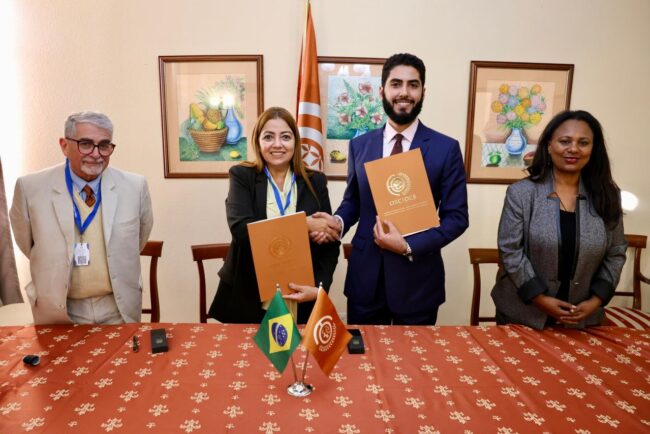
OSC international cooperation with Brazilian universities: up to 400 scholarships
Havana (CUBA), February 10, 2024 – The Secretary-General of the Organisation of Southern Cooperation (OSC), Sheikh Manssour Bin Mussallam, on February 8, signed a Memorandum of Understanding with the Executive Director of the International […]
AFRICA General Latest Magazine News Radio & TV Special Edition TOP STORIES TOP VIDEOS
osc.int
Havana (CUBA), February 10, 2024 – The Secretary-General of the Organisation of Southern Cooperation (OSC), Sheikh Manssour Bin Mussallam, on February 8, signed a Memorandum of Understanding with the Executive Director of the International Cooperation Group of Brazilian Universities, Dr. Rossana Valéria de Souza e Silva, in Havana, Cuba.
Through this historic agreement signed on the margins of the14th International Congress of Higher Education “Universidad: 2024” currently underway in Havana, the International Cooperation Group of Brazilian Universities provides up to 400 annual scholarships per year for Master’s and Doctoral degrees to students from the universities of the OSC Member States to study in Brazil.
The Memorandum recognizes the necessity of South-South cooperation and solidarity for the emergence of a just, prosperous, and sustainable Third Way of Development, which will transform the lives of students of the countries of the South. It further states that “the Organisation of Southern Cooperation (OSC) and the International Cooperation Group of Brazilian Universities (GCUB), resolved to join efforts in service of their shared principles and common objectives, have reached an Understanding, expressed in this Memorandum, on the modalities of their collaboration in the implementation of several projects in line with the Strategic Plan for 2023-2030 of OSC Member States and Associate Members”.
During the signature ceremony, the OSC Secretary-General stated that this Memorandum was a “historic step for the integration of our countries of the South to build the education we need” and constituted simultaneously a “concrete agreement to shape the future we want through a Third Way of Development.” Sheikh Mansour Bin Mussallam states that the “scholarships will have a transformative dimension in the lives of the beneficiaries.” “We should also note that the Memorandum of Understanding is a milestone not only but also a concrete step in the way OSC has embarked on reshaping collaborative and win-win relationships between our countries of the South,” he added.
The GCUB is an association of directors of high-level international Universities that offers a wide range of academic and professional opportunities at the undergraduate and postgraduate levels, with a particular interest in the internationalization of its member Universities.
The Organisation of Southern Cooperation (OSC) was established on January 29, 2020, by countries and organizations across the Global South at the International Summit on Balanced and Inclusive Education held in the Republic of Djibouti. As the first intergovernmental organization of and by the Greater South, the OSC acts as an instrument of intellectual, technical, and financial cooperation and solidarity between its Member States and its Associate Members in pursuing a Third Way of Development – from the South, for Humanity.
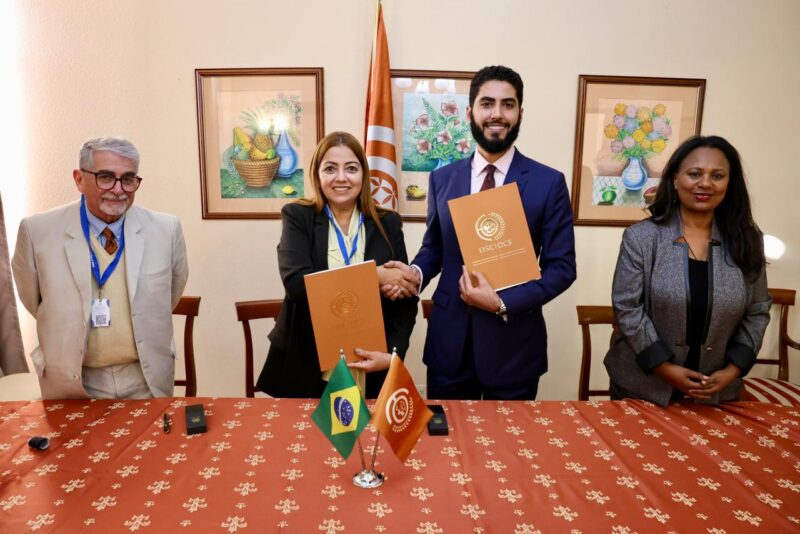
osc.int
###

The Balancing Act
Ethiopia’s Economic Policies, Loans, and the Pursuit of Sustainable Development by 2030 ACE Investment & Impact Advisors As Ethiopia maps its economic course, a meticulous review of its monetary policies unveils a path […]
AFRICA FEATURED Food General Latest Magazine Special Edition TOP STORIES TOP VIDEOSEthiopia’s Economic Policies, Loans, and the Pursuit of Sustainable Development by 2030
 ACE Investment & Impact Advisors
ACE Investment & Impact Advisors

As Ethiopia maps its economic course, a meticulous review of its monetary policies unveils a path defined by strategic maneuvers, adaptability, and a steadfast dedication to ambitious development plans. This analysis spans from the initiation of Growth and Transformation Plans (GTP) to the contemporary Home-Grown Economic Reform Agenda (HGER), offering a comprehensive insight into Ethiopia’s landscape of domestic loans and advances across economic sectors. The aim is to enhance comprehension of how the objectives outlined in the ten-year strategic development plan, extending to 2030, align with and shape this financial trajectory.


Download the high resolution visual in PDF
The Context
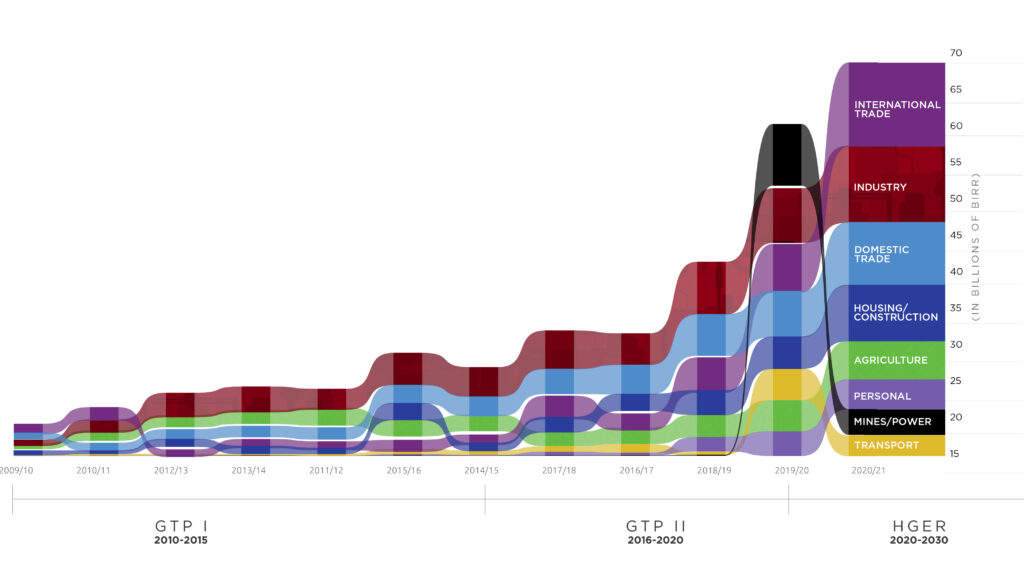
During the initial phase of Ethiopia’s Growth and Transformation Plan (GTP I), spanning from 2010 to 2015, the country’s monetary policy was characterized by a mix of strategies to support the ambitious development goals outlined in the plan. Key features of the monetary policy during this period included:
Credit Controls and Directed Lending
The National Bank of Ethiopia (NBE) employed credit controls to direct funds towards priority sectors, such as infrastructure, agriculture, and industry. A credit cap that restricted lending was in place for three years on banks before it was ended in 2011, and NBE instructed all commercial banks to buy 27pc of their annual loan disbursement in bonds in tandem with its removal of the cap.
Implemented lending initiatives were strategically directed to allocate financial resources to key sectors essential for achieving the plan’s objectives. As evidenced by the policy bank – Development Bank of Ethiopia in its end-of-2016 budget year report, the bank actively participated in GTP-II by formulating plans for loan approval, disbursement, and collection, amounting to Birr 112.28 billion, Birr 104.34 billion, and Birr 39.15 billion, respectively, at the end of the fifth year. This reflects the bank’s alignment with the country’s GTP-I experience and the government’s overarching direction.
Interest Rate and Liquidity Management
NBE strategically employed a multifaceted approach to foster investment in priority sectors while upholding overall economic stability. Through a range of monetary tools, the NBE meticulously balanced the quest for accessible credit with the imperative of averting inflationary pressures. Noteworthy measures included open market operations, where the NBE tactically engaged in T-bill purchases to fine-tune the money supply. This intricate strategy aimed to manage liquidity in the banking system, curbing inflation and ensuring a stable financial environment.
Additionally, the central bank utilized reserve requirements, stipulating the percentage of deposits that commercial banks must maintain as reserves to regulate the overall lending capacity of banks. Furthermore, the NBE adjusted the interest rate at which commercial banks could borrow from the central bank, thereby influencing banks’ borrowing costs and impacting lending rates throughout the economy. For instance, back in September 2021, the NBE raised the interest rate levied on commercial banks on loans from the central bank by 13% percentage points to 16%. The second phase, encompassing GTP II and the first Home-Grown Economic Reform Agenda (HGER I), unfolded from 2015 to 2021, witnessing adjustments in Ethiopia’s monetary policy to align with evolving economic priorities. Key elements of the monetary policy in this extended period, especially in the HGER, include:
Liberalization Efforts
A shift towards a more market-oriented approach was observed, with efforts to liberalize selected sectors of the economy, including Finance and Telecom. The opening up of sectors aimed to attract foreign investment, enhance competition, and foster private sector development.
Inflation Targeting
NBE has strategically shifted its focus towards inflation targeting as a primary objective, emphasizing the preservation of price stability in the economy. Recently, at a hearing in Parliament, the NBE set a 20% inflation target for the end of the Ethiopian fiscal year 2016 (2023/24), promising a significant drop from the previous year’s 33.7% baseline inflation rate.
To achieve this, interest rates and monetary tools have been strategically deployed to manage inflation within a specified target range, aligning with the goals set in the HGER I.
The specific measures include:
- Gradual reduction of direct budgetary advances (slowly decreasing the amount of money the government borrows directly from the central bank to conduct operations or undertake capital projects.)
- Control of the growth of reserve money (managing the amount of money banks keep in their reserves. This is done to ensure financial stability and prevent too much money from being in circulation, which could lead to inflation. It’s like putting a limit on how much water can flow from a tap to prevent flooding.)
- Potential Introduction of market-based monetary policies and instruments. (like term deposits and certificates of deposits (CDs), allowing better money management. With the introduction of capital markets, CDs could be traded among investors in a secondary market, increasing liquidity and efficiency in the financial system.)
Transitioning towards a price-based monetary policy signifies a notable shift in how NBE manages the economy’s monetary dynamics. Moving away from direct control over the money supply, the focus now pivots towards adjustments in interest rates. However, a potential challenge emerges if the injection of money, facilitated by instruments like CDs over an extended period, accelerates. This rapid influx may pose difficulties for the bank in maintaining effective interest rate controls, impacting factors such as inflation, unemployment, and overall economic growth during this transitional phase. While the new approach enhances short-term control, ensuring seamless transition management is crucial to pre-empt potential challenges and ensure sustained success.
Credit Expansion Control
The NBE has allowed for a credit expansion, permitting a growth rate of up to 14% by 2023. This decision can be likened to adjusting the speed of a bicycle, where the economy serves as the bicycle, and the monetary policy lever operates as the gear shift controlling its speed. Much like a bicycle accelerating too quickly, leading to potential accidents, an economy growing too fast can result in economic imbalances or instability. The NBE, acting as a prudent driver, seeks to avoid such risks by permitting a controlled credit expansion. This approach serves as a metaphorical allowance on the gas pedal, regulating the amount of money circulating in the economy. The aim is to strike a balance—allowing enough money for economic growth while preventing an excessive surge in prices.
Transitioning to the subsequent segment, let’s examine a pivotal aspect: the trends in Total Loans Disbursed. This section provides a strategic perspective on the allocation of funds within the economy. Encompassing Phase 1 spanning from 2009/10 to 2017/18, and Phase 2 from 2018/19 to 2020/21, we will scrutinize the distribution of loans and discern the sectors receiving prioritized attention.
Total Loans Disbursed: A Strategic Pulse
Phase 1: 2009/10 – 2017/18
The substantial disbursement of Birr 629.35 billion signifies a significant financial allocation strategically directed towards pivotal sectors. Noteworthy is the prioritization of industry, commanding a substantial 28 percent, highlighting a clear emphasis on fostering economic diversification and growth. Agriculture remains a central focus with a 16 percent allocation, while housing and construction receive 11 percent. However, sectors such as Tourism and Mining are allocated a modest 2 percent and minimal attention, respectively.

Insights
During the GTP I, Ethiopia achieved remarkable economic growth, averaging 10.1 percent against the planned 11.2 percent. The country’s output, measured by Gross Domestic Product (GDP), soared from USD 30 billion in 2009/10 to USD 55 billion in 2013/14, representing an impressive 83 percent increase in just four years.
Employment
The broad-based economic growth, especially in agriculture, service, and industry sectors, created a substantial number of jobs. The service sector, in particular, experienced annual growth rates between 9.9 and 12.2 percent during the first four years of GTP I.
Inflation
Sustainable and stable economic growth during the GTP I period contributed to relatively low inflation rates. Ethiopia’s economic growth irregularity was lower compared to many African countries, maintaining above ten percent growth, except for a dip to 8.6 percent in 2012.
Pro-poor Growth
In alignment with pro-poor spending initiatives, the government significantly increased spending on poverty reduction, leading to tangible improvements in the Human Development Index (HDI). Ethiopia experienced the fastest human development growth globally, with a 3.35 percent annual growth rate in the HDI between 2000 and 2013.
While achieving rapid and sustainable growth, Ethiopia faced challenges in structural transformation. The share of the industrial sector, particularly manufacturing, in the GDP did not meet the planned targets even though it enjoyed high priority both in policy and disbursement. The economy’s dominance by the service sector, mainly trade, indicated a slow structural shift.
Phase 2: 2018/19 – 2020/21
Distributing a colossal sum of Birr 765.11 billion, the disbursement strategy reflects a diversified economic focus. Industry takes the lead with 19 percent, signalling a commitment to robust industrial development. Although Agriculture received only 10 percent, a significant focus shift was witnessed on Mining, which increased from nearly 0 percent share to 9 percent. Meanwhile, allocations for sectors like Tourism and others remained relatively unchanged.
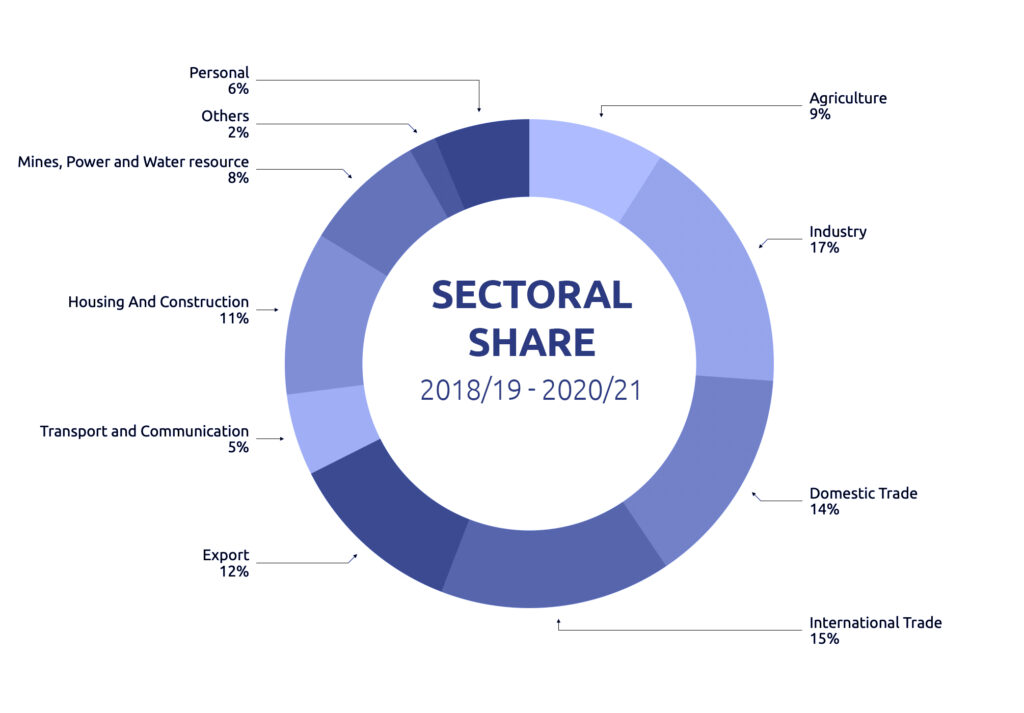
Insights:
Ethiopia’s economic performance from 2018 to 2022 showcased a robust yet challenging landscape. Real GDP exhibited resilience, registering a growth rate of 5.3 percent in 2022, surpassing East Africa’s average. However, inflation surged to 34 percent partly because of the surge in money supply in terms of loans, influenced by internal conflicts, drought, and global events. The fiscal deficit widened to 4.2 percent of GDP in 2022 due to increased defense spending, while the banking sector, dominated by state-owned banks, remained stable with a nonperforming loans ratio of 5.4 percent in 2021. Despite sovereign ratings downgraded to CCC, public debt saw a decline to 50.1 percent of GDP in 2022. Income per capita grew by 2.7 percent, yet the humanitarian support requirements surged to 20 million people.
Comparative Analysis: Total Disbursement Growth
The transition from Phase 1 (2009/10 – 2017/18) to Phase 2 (2018/19 – 2020/21) reflects a notable surge in total disbursements, with an increase of Birr 135.76 billion, marking a substantial percentage change of 21.56%. Despite the eight-year span of Phase 1, Phase 2, encompassing just three years, demonstrated an accelerated average annual growth rate of approximately 7.19%, indicating heightened financial momentum. Noteworthy is the revelation that within the short duration of 2018/19 to 2020/21, the total disbursement of loans and advances constituted a remarkable 23.04% of the entire disbursement made in the extended 2009/10 – 2017/18 period, signaling an unprecedented surge in economic activity.
In examining the outcomes of these loans, the comparative sectoral GDP growth provides insightful patterns. The industry sector, aligning with the trend in sectoral loans, exhibited robust growth, averaging 16.8% from 2009 to 2022. Domestic Trade consistently received support, contributing to the services sector’s average growth of 10.9%. Despite a comparatively lower share in loans, the Agriculture Sector experienced a modest average growth of 5.4%.

Forging Ahead to 2030
As Ethiopia advances into its 10-Year Development Plan, the numbers reveal a grand economic design that allocates loans to the tune of birr 12.2 trillion (87.2%) to meet the investment needs of the private sector while birr 1.8 trillion (12.8%) would cover the finance need of public investment projects. The sectoral breakdown is as follows
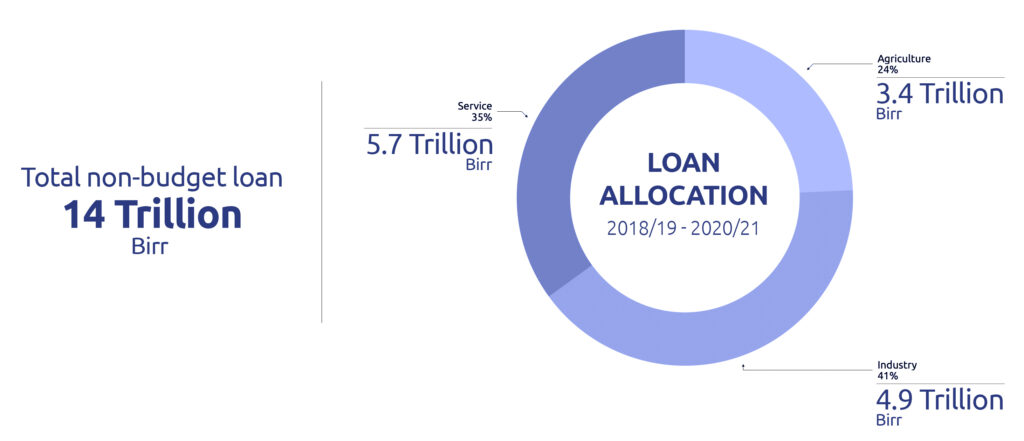
The guiding principles of the ten-year development plan emphasize a shift towards a private-sector-driven economy, allocating a resounding 87.2% for private-sector investment. Diversified financing involving banks, savings, and financial markets underscores a holistic strategy to fund development initiatives. As the plan envisions a transformative period with loans exceeding the trillion ETB milestone, the monetary policy is poised to evolve in the next decade, emphasizing a private-sector-friendly environment. This shift aligns with measures to enhance credit access for businesses, particularly in priority sectors like agriculture, mining, tourism, manufacturing, and ICT.
Further, the plan anticipates increased Foreign Direct Investment (FDI) attraction through continued liberalization efforts, necessitating careful management of capital flows for macroeconomic stability. The central bank’s commitment to inflation control and economic stability is evident, with adjustments in interest rates and other monetary tools, set at 20% for 2023. To enhance resilience to global shocks, the monetary policy framework is expected to draw on lessons from experiences such as the COVID-19 pandemic, while also continuing to play a crucial role in directing funds towards critical infrastructure projects, supporting sustainable economic development.
Conclusion
The outlined transformation in the ten-year development plan lays a robust foundation for a decade-long evolution of monetary policy, emphasizing private sector development and growth in key sectors. To enhance economic stability, it is imperative for the National Bank to effectively deploy monetary tools, address exchange rate challenges, and ensure the prudent disbursement of credit to priority sectors. A dedicated commitment to managing capital flows and controlling inflation, especially within the set target of 20 percent for 2023, is crucial for macroeconomic stability. As Ethiopia progresses toward economic prosperity, the strategic and multifaceted monetary policy framework should be steadfastly implemented to navigate challenges, foster resilience, and achieve sustainable growth.
NBE Annual Reports 2009 – 2021
Search:
| Economic Sectors | 2009/10 | 2010/11 | 2011/12 | 2012/13 | 2013/14 | 2014/15 | 2015/16 | 2016/17 | 2017/18 | 2018/19 | 2019/20 | 2020/21 | Totals |
|---|---|---|---|---|---|---|---|---|---|---|---|---|---|
| Agriculture | 4.44 | 8.25 | 14.18 | 9.71 | 10.87 | 13.08 | 13.38 | 13.13 | 11.40 | 17.95 | 24.90 | 30.78 | 172.06 |
| Industry | 4.96 | 10.47 | 16.51 | 19.30 | 20.39 | 23.44 | 25.50 | 25.04 | 30.50 | 41.59 | 43.07 | 60.61 | 321.36 |
| Domestic Trade | 5.17 | 6.73 | 9.70 | 8.33 | 9.10 | 15.59 | 15.04 | 23.61 | 19.94 | 32.87 | 36.40 | 49.96 | 232.44 |
| International Trade (Total) | 8.22 | 10.57 | 7.06 | 5.97 | 7.28 | 8.42 | 9.53 | 13.49 | 18.61 | 27.67 | 38.29 | 66.14 | 221.26 |
| International Trade (Export) | 5.28 | 5.92 | 2.66 | 2.57 | 2.97 | 3.78 | 4.40 | 6.06 | 11.60 | 17.41 | 28.02 | 51.71 | 142.39 |
| International Trade (Import) | 2.94 | 4.65 | 4.40 | 3.70 | 4.31 | 4.63 | 5.12 | 7.43 | 7.00 | 10.26 | 10.49 | 14.44 | 79.38 |
| Hotels and Tourism | 0.32 | 0.3954 | 0.46 | 0.88 | 1.19 | 1.62 | 1.89 | 2.21 | 2.20 | 4.94 | 5.29 | 8.17 | 29.57 |
| Transport and Communication | 0.97 | 1.85 | 1.92 | 1.58 | 1.56 | 3.63 | 4.49 | 6.92 | 4.53 | 2.65 | 25.04 | 16.43 | 71.55 |
| Hosing And Construction | 3.92 | 2.90 | 5.08 | 6.32 | 6.70 | 6.72 | 13.64 | 13.58 | 12.28 | 19.64 | 25.53 | 44.53 | 160.85 |
| Mines, Power and Water resource | 0.01 | 0.0073 | 0.02 | 0.08 | 0.27 | 0.17 | 0.34 | 0.36 | 0.32 | 0.85 | 48.53 | 20.17 | 71.12 |
| Others | 0.34 | 0.7119 | 0.91 | 1.53 | 1.90 | 2.16 | 3.16 | 8.45 | 12.67 | 4.90 | 4.58 | 9.11 | 50.43 |
| Personal | 0.27 | 0.3117 | 0.18 | 0.26 | 0.27 | 0.67 | 1.05 | 2.20 | 2.95 | 11.43 | 19.31 | 23.55 | 62.46 |
| Interbank Lending | 0.30 | 0.01366 | 0.09 | 0.00 | 0.45 | 0.00 | 0.00 | 0.00 | 0.00 | 0.00 | 0.00 | 0.00 | 0.85 |
| Total | 28.91 | 42.21 | 56.10 | 54.25 | 59.97 | 75.48 | 88.02 | 109.01 | 115.40 | 164.49 | 271.17 | 329.45 | 1394.46 |
Showing 1 to 14 of 14 entries




